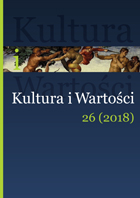Stanowisko G.W.F. Hegla wobec Teoriopoznawczego dualizmu w Pewności zmysłowej
G.W.F. Hegel’s view on epistemological dualism in “Sense-Certainty”
Author(s): Michał BochenSubject(s): Metaphysics, Epistemology, 19th Century Philosophy, Phenomenology, Ontology
Published by: Wydawnictwo Naukowe Uniwersytetu Marii Curie-Sklodowskiej
Keywords: Phenomenology of Spirit; Hegel; subject-object relation; naïve realism; phenomenalism;
Summary/Abstract: Interpreted in this paper is Sense-Certainty: Or the ‘This’ and ‘Meaning’, a chapter from G.W.F. Hegel’s Phenomenology of Spirit. The author seeks to prove that according to Hegel, the dualistic nature of the subject-object relation is problematic and implausible even with knowledge about sensual beings. The author argues that such interpretation is consistent with the metaphilosophical intentions of the whole Phenomenology of Spirit. It is not confined solely to demonstrating the impossibility of non-conceptual empirical knowledge as it relates above all to the nature of epistemic relation on its most fundamental level. Hegel indicated that every problem encountered by sense certainty, can be solved by proper reformulation of the subject-object relation. The author concludes that the qualitative distinction between subject and object is unjustified, and hence there is no reason to accept the notion of real and entirely external sensual objects. Consequently, he rejects naïve realism and constraints of kantian phenomenalism.
Journal: Kultura i Wartości
- Issue Year: 2018
- Issue No: 26
- Page Range: 95-117
- Page Count: 23
- Language: Polish

